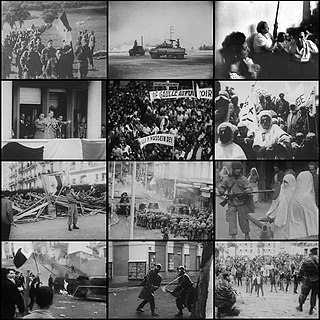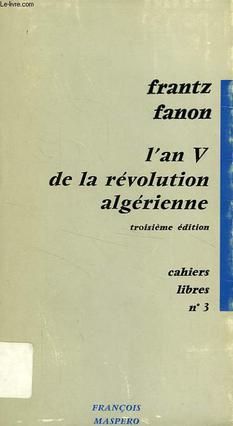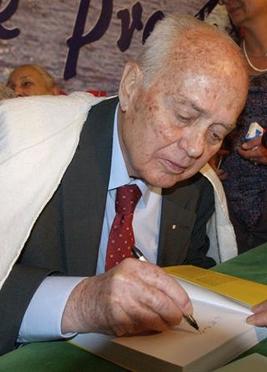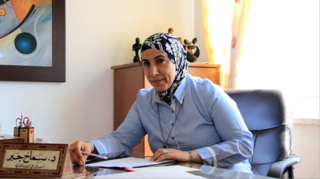
The Algerian War was a major armed conflict between France and the Algerian National Liberation Front (FLN) from 1954 to 1962, which led to Algeria winning its independence from France. An important decolonization war, it was a complex conflict characterized by guerrilla warfare and war crimes. The conflict also became a civil war between the different communities and within the communities. The war took place mainly on the territory of Algeria, with repercussions in metropolitan France.

Frantz Omar Fanon was a French Afro-Caribbean psychiatrist, political philosopher, and Marxist from the French colony of Martinique. His works have become influential in the fields of post-colonial studies, critical theory, and Marxism. As well as being an intellectual, Fanon was a political radical, Pan-Africanist, and Marxist humanist concerned with the psychopathology of colonization and the human, social, and cultural consequences of decolonization.

Blida is a city in Algeria. It is the capital of Blida Province, and it is located about 45 km south-west of Algiers, the national capital. The name Blida, i.e. bulaydah, is a diminutive of the Arabic word belda, city.

Fatima-Zohra Imalayen, known by her pen name Assia Djebar, was an Algerian novelist, translator and filmmaker. Most of her works deal with obstacles faced by women, and she is noted for her feminist stance. She is "frequently associated with women's writing movements, her novels are clearly focused on the creation of a genealogy of Algerian women, and her political stance is virulently anti-patriarchal as much as it is anti-colonial." Djebar is considered to be one of North Africa's pre-eminent and most influential writers. She was elected to the Académie française on 16 June 2005, the first writer from the Maghreb to achieve such recognition. For the entire body of her work she was awarded the 1996 Neustadt International Prize for Literature. She was often named as a contender for the Nobel Prize for Literature.
Francesc Tosquelles, also known as François Tosquelles due to having lived in France for many years, was a Catalan psychiatrist.

A Dying Colonialism is a 1959 book by the psychiatrist Frantz Fanon, in which the author provides an account of the Algerian War. The book details cultural and political changes that emerge due to the rejection of French colonial oppression by the Algerian. Issues discussed include the role of women in the liberation struggle, changes to family life, the role of the radio, language, and medicine both as tools of oppression and complicity on one hand as well as tools of freedom and liberation, and Algeria's European minority and their role as potential allies in the conflict.

Pierre Chaulet was a French-Algerian doctor who worked with the National Liberation Front (FLN) during the Algerian War and was instrumental in Algeria's successful campaign to eradicate tuberculosis.
Jacques Chevallier was a liberal pied noir mayor of Algiers who governed the city at the head of a coalition of pied noir and Moslem representatives.

The culture of Algeria encompasses literature, music, religion, cuisine, and other facets of life in Algeria.

The Cité nationale de l'histoire de l'immigration is a museum of immigration history located in the 12th arrondissement of Paris at 293, avenue Daumesnil. The nearest métro station is Porte Dorée. It is open Tuesday through Friday from 10 a.m. to 5:30 p.m. and weekends from 10 a.m. to 7 p.m.; an admission fee of €4.50 is charged.
Antoinette Fouque was a French psychoanalyst who was involved in the French women's liberation movement. She was the leader of one of the groups that originally formed the French Women's Liberation (MLF), and she later registered the trademark MLF specifically under her name. She helped found the publishing house Éditions des Femmes as well as the first collection of audio-books in France, "Bibliothèque des voix". Her position in feminist theory was primarily essentialist, and heavily based in psychoanalysis. She helped author Le Dictionnaire universel des créatrices (2013), a biographical dictionary about creative women.
Antoine Porot was a French psychiatrist. He founded what was known as the Algiers School of psychiatry, which attempted to justify the inherent racism in the French colonial mission in Algiers on the basis that Algerians, i.e. the Muslim non-ethnically French inhabitants, were biologically inferior. Frantz Fanon discusses his theories and the impact on Algerian colonial society in his book, The Wretched of the Earth.

Samira Negrouche, francophone Algerian writer and poet, born in Algiers, on September 13, 1980. Also a Medical Doctor, she lives and works in Algeria.

Abdelmalek Sayad, was a sociologist, first as an assistant to Pierre Bourdieu, then as a research director at the French CNRS and at the School for Advanced Studies in the Social Sciences. He studied migration issues in French social sciences.

Samah Jabr is a Palestinian Jerusalemite psychiatrist, psychotherapist and writer. Since 2016, she has been the Head of the Mental Health Unit at the Palestinian Ministry of Health, and has written columns about the psychological consequences of the Israeli occupation in Palestine since the 2000s. Inspired by anticolonial psychiatrist Frantz Fanon, her areas of interest include mental health, colonialism and universal human rights.

Toward the African Revolution is a collection of essays written by Frantz Fanon, which was published in 1964, after Fanon's death. The essays in the book were written from 1952 to 1961, between the publication of his two most famous works, Black Skin, White Masks and The Wretched of the Earth. Fanon expands on the themes of colonization, racism, decolonization, African unity, and the Algerian Revolution in the essays, most of which come from his time writing for El Moudjahid, the official newspaper of the FLN.
Djamila Debèche, sometimes written Debêche or Debbeche, was French-Algerian feminist writer. She was a pioneering journalist and novelist in Algeria, where she was one of the first women writers of the French colonial period.
Elaine Mokhtefi is an American and Algerian activist, translator, and writer. Born in New York, Mokhtefi began working as a translator for anti-racist and anti-colonial activist movements after moving to Paris in her twenties. She supported Algerian independence efforts, then lived in Algeria from 1962 until she was forced to leave the country in 1974. Her memoir of her time there, Algiers, Third World Capital: Freedom Fighters, Revolutionaries, Black Panthers, was published by Verso Books in 2018.

Elsa Dorlin is a French philosopher and professor in the department of political science at University of Paris 8 Vincennes/St. Dénis.
Samia Henni is a writer, historian, educator, and curator. She teaches history of architecture and urban development at Cornell University. Her work focuses on the intersection of the built and destroyed environments with colonial practices and military operations from the early 19th century up to the present days.













